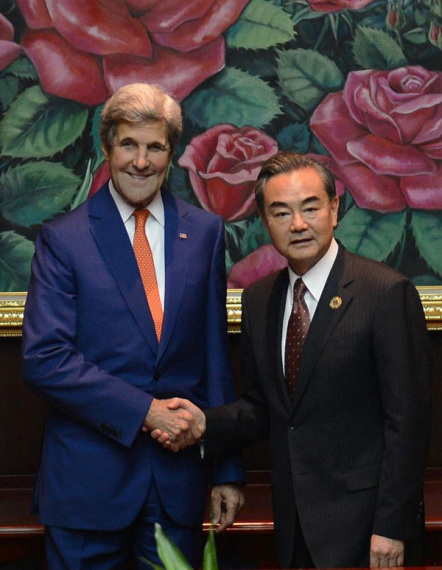
Chinese Foreign Minister Wang Yi(right) meets with US Secretary of State John Kerry in Vientiane, capital of Laos, July 25, 2016. (Photo/Xinhua)
The South China Sea disputes, after so much fanfare, seem to be heading toward the right direction of peaceful settlement through bilateral negotiations.
The latest development appears encouraging, with U.S. Secretary of State John Kerry saying, during a meeting with Chinese Foreign Minister Wang Yi on Monday, that Washington "is not taking sides on the substance of maritime disputes" and supports Beijing and Manila resuming talks.
Indeed, it is time for parties concerned to move away from the tensions and "turn the page", as Kerry reportedly said.
Yet sincerity is subject to proof. The United States must take concrete actions to repair the damage it has caused and show it means what it says.
The worry is understandable, for a joint statement issued by the foreign ministers of the U.S., Japan and Australia in Vientiane, Laos, on Monday, still harped on the same old string by pointing an accusing finger at China, trying to depict it as a troublemaker and a threat to countries in the region.
It takes much effrontery and hypocrisy for the three countries to continue to play their self-appointed roles as guardians of peace in the South China Sea.
Their trick of confusing right and wrong cannot cover up the fact that the regional bloc rejected the trio's proposal to even mention, in a statement after their foreign ministers' meeting, the award by The Hague arbitral tribunal in the case unilaterally initiated by the Philippines against China, let alone support it. It is noteworthy that it happened despite the trio pressing the issue with ASEAN members.
Instead, ASEAN called for the nations directly involved in the sea disputes to engage in bilateral negotiations, which matches the China-ASEAN stance on how to peacefully resolve the disputes between the respective disputing parties.
This is a resounding defeat for outside interventionism.
And it makes the trio's statement seem like a desperate attempt to save face, after their miscalculation and overestimation of their ability to manipulate and pit ASEAN members against China, or one another.
None of the three countries are claimants in the South China Sea disputes, nor are they directly involved in the disputes.
Their eagerness to feign righteousness under the pretext of protection of freedom of overflight and navigation while stoking tensions in the South China Sea stems from their own selfish agenda to contain a rising China.
But that ruse is no longer effective, as has been proved by the embarrassing situation the trio find themselves in at the ASEAN gathering.


















































